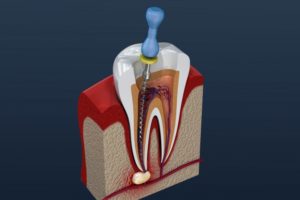
When you think of scary dental procedures, you probably think of a root canal. They have a reputation as the most painful thing your dentist can do. However, they’re actually not painful at all. In fact, they can relieve pain. If you are going through severe dental discomfort, you might end up needing one to alleviate your symptoms. How do you know when you need a root canal? Your emergency dentist in Fayetteville, NY is here to clear things up.
What Is a Root Canal?
Root canal therapy, or more commonly referred to as simply a root canal, is a last-resort treatment to save a broken or infected tooth from needing to be extracted. It involves your dentist creating a hole in your tooth to reach the pulp and nerve on the inside. Then he or she will clean the area, remove the decay and nerve, and place a synthetic material into the pulp to keep the tooth alive. To finish up, your dentist will slip a crown over the tooth to protect it from further damage or decay.
Do I Need a Root Canal?
The most common reason a root canal is needed is because a cavity reached the inside of the tooth. This is why it’s important to get a cavity treated as soon as possible, to keep the decay out of the pulp. Other signs that you might need a root canal in Fayetteville include:
- Prolonged sensitivity to hot and cold foods and beverages
- Persistent pain
- Swollen gum area
- Dark discoloration of a tooth
- Chip or crack in a tooth
Does a Root Canal Hurt?
Root canals have a bad reputation of being painful. However, many people have said that the procedure doesn’t feel much different from getting a simple filling. Your dentist will use a local anesthetic to numb the area, and you shouldn’t really feel a thing. The pain associated with root canals typically comes from before the procedure, but afterwards, you should feel relief from the pain.
What Should I Do After a Root Canal?
Your tooth will probably be fairly sensitive for a few days after your root canal. This can be remedied with over-the-counter pain relievers like ibuprofen, which can also reduce the risk of swelling. It’s best to stick to softs foods, like yogurt, soup, and pasta, for the next few days while the site heals. In addition, try and avoid chewing on anything particularly hard or sticky with your temporary crown.
Although root canals may seem scary, in reality they are a perfectly normal and sometimes necessary procedure. Be sure to let your dentist know if you experience any of the symptoms listed above.
About the Author
Dr. Marley Rinoldo earned her dental degree from SUNY Buffalo School of Dental Medicine, and has practiced as a dentist for almost a decade now. She loves helping patients achieve happy, healthy smiles and saving their teeth with root canal therapy. To learn more about how Dr. Rinoldo can save your teeth, contact her at (315)-449-0711.

